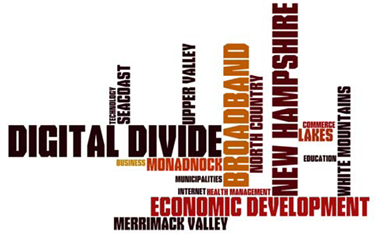Expanding Broadband Access
Broadband internet has become integral to improving economic opportunity and quality of life of New Hampshire’s residents. Over the past 20 years, Federal, state, and local government—as well as telecommunications and other industry sectors—have made significant investments to build out the necessary infrastructure to expand broadband access. In fact, just over a decade ago, only about 60% of New Hampshire residents had access to high-speed internet, as defined by the Federal Communications Commission (FCC). Today, that number has risen to around 90%. Currently, broadband internet is defined by the FCC as a minimum of 25 Mbps download and 3 Mbps upload speeds.

Despite the significant gains, there are still many New Hampshire residents who do not have access to high-speed internet, in part because of access to infrastructure and in part due to cost. In fact, there are still rural pockets of the state where there is limited access to the internet. And even if it is technically available in a particular locale, some financially stretched households cannot afford the cost. The result is that many individuals and families still do not have broadband in their homes and thus find themselves at a disadvantage when it comes to access to educational resources, employment opportunities, health care, and other resources that are key to one’s economic, physical, and social well-being.
The link between broadband and economic opportunity is clear in the literature. A 2013 study by Pew found that students without access are more likely to have more limited career opportunities after completing high school than those that do. Another study reveals that internet-connected high school graduates are twice as likely to go to college as those who are not online. Regarding the overall economy, economic data from the Bureau of Labor Statistics and the US Census suggests that employment has grown faster in regions that have better internet access.
The lesson here is that while New Hampshire has made strong gains in expanding high-speed internet to more people, there are still geographic and demographic sectors that do not have equal access. If we are to continue to grow the state’s economy and provide economic opportunity, it will be important to identify the gaps and plan strategies for expanding access and enabling all people to engage in the economic opportunities that broadband provides. To that end, the state will soon be investing significant resources to create a digital equity and inclusion plan. Such strategies could potentially include leveraging existing capacity and forging public-private partnerships between employers, schools, libraries, and companies that already have the necessary infrastructure.
One thing is for certain: the more people that have access to high-speed internet, the stronger the state’s economy and quality of life will be.